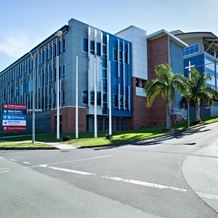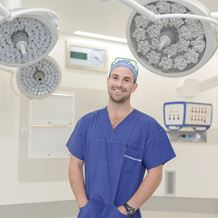Tony's Self Funded Bariatric Surgery
St Vincent's Private Hospital Northside

Tony before his bariatric surgery
Tony weighed 140kg and paid for his own bariatric surgery: “It was the best investment decision of my life”
Brisbane forklift driver and St Vincent’s Private Hospital Northside patient Tony Salmon weighed 140kg and reached a critical point in his life which led him to self-fund gastric bypass surgery last year. He says it was the best investment he has ever made.
The 46-year old father-of-three from Caboolture South, near Brisbane, said he tossed and turned about dipping into his superannuation fund early, but figured he might not be around to retire if he didn’t act.
He assumed his health fund (with Bronze cover) would have covered him for bariatric surgery, but was told he would need to wait at least 12 months if he switched to Gold level, because his obesity was regarded as a pre-existing health condition.
“I was pretty devastated at the time to learn that it wasn’t covered … I assumed my weight issues would have been regarded as a fairly big health issue and that the health fund would allow me to have surgery as a solution,” he said.
At St Vincent's Private Hospital Northside, new self-funded surgery packages help patients to skip the queues and enjoy hassle-free healthcare on their own terms. The packages cover bariatric and orthopaedic surgery.
The self-funded option has a wide range of benefits – allowing patients to skip the public hospital queue, access affordable healthcare treatment with transparent upfront costs and receive private hospital care from an internationally-acclaimed private hospital providing patient-centred care to thousands of people every year. (Self-funded surgery packages are available at most St Vincent’s Private Hospitals in Queensland, New South Wales and Victoria.)
For patient Tony, his weight ballooned out to 140kg for a variety of reasons.

Tony after his bariatric surgery
“Over the years as life got busy with family and work, I just fell into bad eating habits, binge eating and emotional eating and it became a vicious cycle,” says Tony.
“I would eat rubbish food on a daily basis over a period of time – I would stack on the weight, I would feel worse about myself – maybe I’d go on a diet for a month or two and lose 5kg but then I would ‘fall off the wagon’ and I would put the weight back on plus more!!
“After years of living life this way I could tell my health was deteriorating. I had been a heavy smoker in my 20s and 30s and despite the fact I’d given up smoking some years ago, my respiratory system wasn’t great and I would get asthma. Plus, I couldn’t even walk up a flight of stairs without getting puffed. I’d have to stop halfway up the flight.
“The bigger I got, the less active I became. I just felt like I was going nowhere in terms of trying to lose weight and in the end you sort of give up a bit.
“My wife, who’s a nurse, would regularly talk to me about getting serious about my weight and eating habits and she was worried about me. I wasn’t happy with where my life was at but I felt stuck – I was fighting with the family, cranky a lot of the time, I wasn’t sleeping well so I was tired at work and tired all day and that just became a never-ending cycle.
“I went to see my GP and got referred to a bariatric surgeon at St Vincent’s Private Hospital Northside - Dr Rob Finch - who told me some harsh truths about my life expectancy and future quality of life.

Dr Robert Finch, Bariatric Surgeon at St Vincent's Private Northside
“Dr Finch suggested gastric bypass surgery as the best option. I just made my mind up I didn’t want to continue down this path then have heart issues or a stroke in five or six years. It was as simple as that.”
He said he didn’t have regrets about accessing his super. Tony had surgery with bariatric surgeon Dr Finch in October 2024. Post surgery he’s now around 100kg and hopes he could lose around another 10kg.
“It seemed a lot simpler to pay (for the surgery) myself, you’re paying a lot of money for private health, a lot of the times to be honest. I don’t understand why I’m paying so much and there’s minimal extras you can use,” says Tony.
“Some people say that having bariatric surgery is ‘cheating’ or that I did it the ‘easy way’ but I can tell you there’s nothing easy about having major bariatric surgery and you have to completely change your mindset and your diet after the surgery and stay disciplined or you won’t get the benefits.”
Dr Rob Finch of St Vincent’s Private Hospital Northside says obesity is reaching epidemic proportions in Australia which has one of the highest rates in the world, ranking fifth among OECD countries. Around 14 million Australians are living with obesity or are overweight – that’s 2 in every 3 adults and 1 in 4 children.
Dr Finch is a leading exponent of new and emerging bariatric (weight loss) procedures and techniques – and has performed bariatric surgery on more than a thousand patients over more than 15 years.
Dr Finch says it’s important for people living with obesity to understand that there are inevitably long-term health consequences with an elevated risk of serious illness and disease as they grew older.
"Obesity is commonly associated with a range of metabolic disorders such as Type 2 diabetes, cardiovascular disease, non-alcoholic fatty liver disease, chronic kidney disease and many cancers.
"If untreated, obesity will almost certainly catch up with people as they age and that can be any time from their 30s until their 60s and 70s - if they live that long.”
Dr Finch says gastric bypass surgery is one of the oldest and most established weight loss surgeries performed for around 50 years and is the most effective procedure for weight loss.
The major innovation in recent years which has made it more appealing, safer and popular is that most procedures are minimally invasive via keyhole surgery.
The latest figures show that the number of self-funded admissions to private hospitals for a range of surgeries rose to almost 391,000 in 2022-23, up from 305,000 in 2018-19.

St Vincent’s Health Australia Chief Medical Officer, Associate Professor Michael Franco
St Vincent’s Health Australia Chief Medical Officer, Associate Professor Michael Franco, says he’s noticed an uptick within the group’s 10 private hospitals of patients choosing the “third option” of paying for surgery themselves because they didn’t have the top cover of private health insurance.
He expects this to grow further after the latest 3.7 per cent price hike – the largest increase since 2018 – that came into effect on April 1.
“We’ve seen a trend in Australia of uptake of this third option of people saying ‘I don’t have private health insurance but I’ve got the ability to pay for a procedure I might need and I don’t necessarily want to stay on the public waiting list’,” Associate Professor Franco said.
“There are risks with not having private health insurance, that’s why we’ve narrowed what we’re saying is the third option to common things that are not super urgent that we can have a pretty high confidence on what the cost will be.”
To find out more about self-funded surgery, visit the St Vincent’s web site with the dedicated self-funded surgery web page.
- Home
- Patient News
- Tony's Self Funded Bariatric Story




